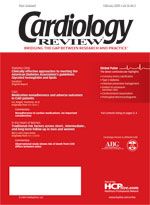A patient with atrial fibrillation after cardiac surgery
A 44-year-old man with newly diagnosed 3-vessel coronary disease was scheduled for 4-vessel coronary artery bypass graft surgery.
A 44-year-old man with newly diagnosed 3-vessel coronary disease was scheduled for 4-vessel coronary artery bypass graft surgery. His risk factors included obesity (body mass index, 38 kg/m2), hypertension (135/86 mm Hg), dyslipidemia (total cholesterol, 222 mg/dL; low-density lipoprotein cholesterol, 155 mg/dL; high-density lipo­protein cholesterol, 37 mg/dL; triglycerides, 154 mg/dL), and cigarette smoking. He had only mild anginal symptoms, with no dyspnea. He had never had myocardial infarction, atrial fibrillation, heart failure, or pulmonary disease. His father had coronary heart disease, and his brother had a cerebrovascular infarction. Results of his resting electrocardiogram showed no abnormalities. At the time of surgery, his medications included metoprolol (Lopressor) 50 mg and hydrochlorothiazide (HydroDIURIL, Esidrix, Oretic) 25 mg.
A transthoracic echocardiogram showed a left atrial volume of 76 mL/m2, an ejection fraction of 50%, and a diastolic function grade of II (pseudonormalization with elevated filling pressures). The left ventricle showed signs of hypertrophy, with an interventricular septal wall thickness of 16 mm. Only trivial mitral regurgitation was present, with otherwise normal cardiac valves.
After uneventful surgery with a cross-clamp time of 54 minutes, the patient resumed his normal metoprolol therapy. On the second postoperative day, he developed atrial fibrillation. Pharmacologic conversion to sinus rhythm was first attempted with amiodarone (Cordarone), but sinus rhythm was only obtained after additional administration of digitalis. Overall, the patient experienced multiple episodes of atrial fibrillation, totaling 35 hours, with the longest episode lasting 24 hours. After 6 days, the patient was discharged in sinus rhythm receiving anticoagulation therapy, but was again found to be having atrial fibrillation 3 months later.
